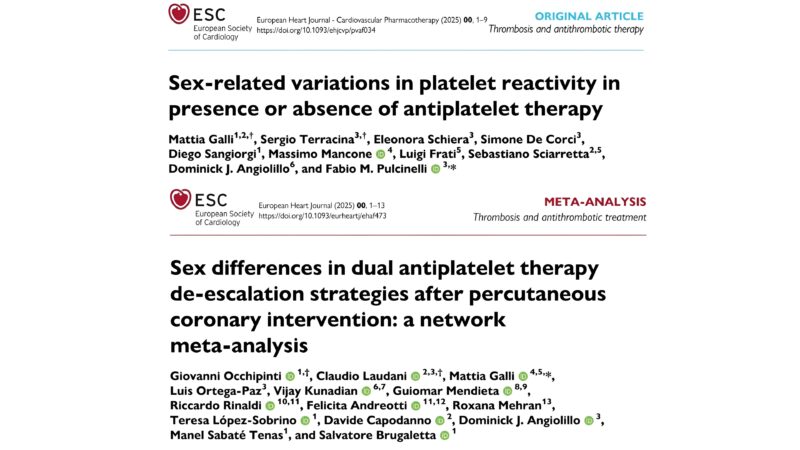
Mattia Galli: Sex-related Differences in Platelet Reactivity in Patients Both On and Off Antiplatelet Therapy
Mattia Galli, Assistant Professor at Sapienza Università di Roma, Associate Editor of European Heart Journal, shared a proud post on LinkedIn:
”Sex-related differences in platelet reactivity are emerging as a relevant factor in patients both on and off antiplatelet therapy.
In these two recent contributions, published almost simultaneously, we present evidence from both randomized controlled trials and the largest pharmacodynamic study in this setting to date, suggesting that females may benefit from antiplatelet regimens different from those typically used in males.
This represents another important step forward in advancing precision medicine in cardiology.”
Read the full articles in European Heart Journal and EHJ Cardiovascular Pharmacotherapy.
Article 1: Sex differences in dual antiplatelet therapy de-escalation strategies after percutaneous coronary intervention: a network meta-analysis
Authors: Giovanni Occhipinti , Claudio Laudani , Mattia Galli , Luis Ortega-Paz , Vijay Kunadian , Guiomar Mendieta , Riccardo Rinaldi , Felicita Andreotti , Roxana Mehran , Teresa López-Sobrino , Davide Capodanno , Dominick J Angiolillo , Manel Sabaté Tenas , Salvatore Brugaletta
Article 2: Sex-related variations in platelet reactivity in presence or absence of antiplatelet therapy
Authors: Mattia Galli , Sergio Terracina , Eleonora Schiera , Simone De Corci , Diego Sangiorgi , Massimo Mancone , Luigi Frati , Sebastiano Sciarretta , Dominick J Angiolillo , Fabio M Pulcinelli

Stay updated on all science in the field of platelet disorders with Hemostasis Today.
-
Feb 25, 2026, 09:14Nominations are Open for 2027 Committee and Leadership Positions – ASH
-
Feb 25, 2026, 09:08Bastu Odoka: Closing the Gap on Anti-D Prophylaxis in Maternal Care
-
Feb 25, 2026, 08:53Eiman Alzaabi: Sharing Rare Observations and Challenging Assumptions in Transfusion Medicine
-
Feb 25, 2026, 08:40Matthew Flick։ A Great Gordon Research Conference on Plasminogen Activation and Extracellular Proteolysis
-
Feb 24, 2026, 16:18Salmaan Dalvi: Mapping Rare Diseases Across East and Central Africa
-
Feb 24, 2026, 16:16Wolfgang Miesbach: Game‑Changing Data on Intensive FVIII Replacement in Haemophilia A with Hypertrophic Synovium
-
Feb 24, 2026, 16:01Is It Safe to Briefly Stop Anticoagulation After VTE? – RPTH Journal
-
Feb 24, 2026, 15:58Anastasia Conti: Honored to Receive the Roche Foundation Grant for Independent Research in Onco-Hematology
-
Feb 24, 2026, 15:55Courtney Lawrence: Targeted Donor Screening Reduces Transfusion-Transmitted Babesia Cases

